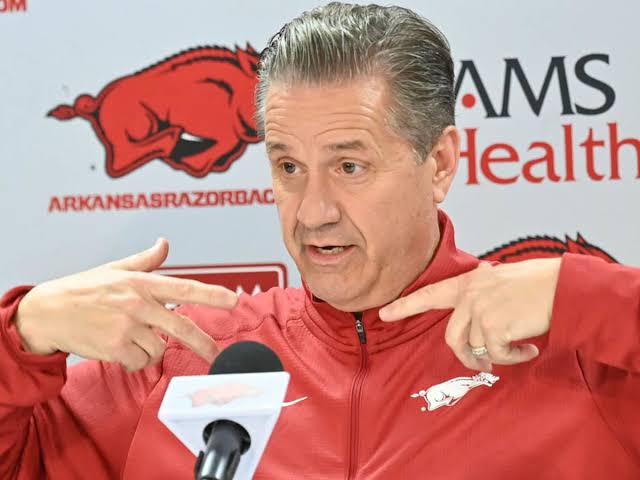FAYETTEVILLE, Ark. — “I’m Not Playing That Game”: Arkansas Razorbacks Coach John Calipari Explains Why He Refuses to Negotiate With Players Seeking More NIL Money
In a college basketball landscape increasingly shaped by Name, Image, and Likeness (NIL) deals, Arkansas Razorbacks head coach John Calipari is taking a firm—and some might say controversial—stance. Known for decades as a players’ coach and master recruiter, Calipari is now drawing a clear line in the sand: he will not negotiate with student-athletes over NIL compensation once they’re on the team.
Speaking in a recent interview with Arkansas sports media, Calipari didn’t mince words when asked how he’s navigating the complexities of NIL in his first season with the Razorbacks.
> “If a player comes to me and says, ‘Coach, I need more money,’ I tell them flat out—this isn’t professional free agency,” Calipari said. “I’m not playing that game. I’m not negotiating with kids about dollars once they’re on the roster.”
Calipari’s hardline position stands in stark contrast to the increasingly transactional nature of college sports, where players now have more leverage than ever. Across the country, top athletes are securing six- and even seven-figure NIL deals. Some have used that leverage to extract more favorable terms from programs, or even transfer if they feel underpaid.
But Calipari is having none of it.
A Line in the Sand
The 65-year-old coach, who left Kentucky in April to take over at Arkansas, believes that once a player commits and joins the team, their focus should shift to development, team success, and education—not financial renegotiations.
> “I tell every recruit and their family the same thing from day one: If you’re looking for a bidding war, don’t come here,” he explained. “You’ll be treated like family. You’ll be developed like a pro. But if you want to keep asking for more money every few months, this isn’t the place for you.”
According to Calipari, his goal is to create a team-first culture where players buy into the collective mission rather than individual gain. He believes that NIL should reward performance and marketability organically—not as a bargaining chip used to strong-arm coaching staffs or boosters.
> “NIL is a great thing,” he said. “It’s empowering players and giving them real-world value. But when it turns into a negotiation every week, that’s when you lose the purity of college sports.”
Razorback Nation Reacts
Calipari’s remarks have sparked intense debate across Razorback Nation, with fans and analysts divided on whether his philosophy will succeed in the NIL era.
Some fans praised his stance as a much-needed correction in a system many feel has spiraled out of control.
> “Finally, a coach with a backbone,” one fan posted on X (formerly Twitter). “Players need to remember they’re still student-athletes, not mercenaries.”
Others, however, questioned whether the policy could hurt Arkansas’s chances of landing elite talent, especially in a recruiting environment where NIL offers can often tip the scale.
> “This is the new world of college basketball,” one skeptical fan commented. “You can’t pretend it’s still 2012. If Cal wants to win big, he’s gonna have to play the game everyone else is playing.”
Inside the Locker Room
So far, it appears that Calipari’s message is resonating with his current roster. Several players have come forward to say that the coach’s directness and transparency actually made them more comfortable committing to the program.
> “Coach Cal told me straight up how it was going to be,” said one incoming freshman guard. “No fake promises, no dollar signs dangled in front of me. Just hard work and opportunity. That’s what I signed up for.”
Calipari also emphasized that he’s not anti-NIL—far from it. He’s worked closely with Arkansas’s collective, One Razorback, to ensure players have legitimate opportunities to profit from endorsements, appearances, and branding deals. But he draws the line at mid-season renegotiations or threats to transfer based on NIL demands.
> “We’ll help players maximize their value,” Calipari said. “But we’re not going to let NIL become a cancer in the locker room. Once you give in to that, you’ve lost control.”
A Broader Statement
Calipari’s remarks come at a time when coaches around the country are grappling with similar challenges. Many have admitted—off the record—that NIL negotiations are causing tension in locker rooms, disrupting team chemistry, and undermining authority.
> “It’s free agency every year now,” one SEC coach said anonymously. “You lose a guy because another school offers $100K more. You keep another guy because a donor steps in last minute. It’s chaos.”
By speaking publicly, Calipari may be positioning himself as a leader in a potential counter-movement: a push to restore order and values in a system that many believe has gone off the rails.
Whether that approach will translate into wins in the ultra-competitive SEC remains to be seen. But Calipari has never been afraid to be the face of a bold philosophy—whether it was “one-and-done” at Memphis and Kentucky, or now, a values-based approach to NIL in Fayetteville.
The Road Ahead
With summer workouts underway and a new-look Arkansas roster in place, Calipari seems energized by the challenge. He’s embracing the opportunity to build not just a team, but a culture.
> “I want guys who want to be here,” he said. “If you’re chasing a quick check, you’re chasing the wrong thing. If you’re chasing greatness, we’ll chase it together.”
Time will tell whether Calipari’s firm stance on NIL will prove visionary or stubborn. But one thing is certain: in an era full of gray areas, he’s offering a rare glimpse of black-and-white leadership.
And for better or worse, the Razorbacks are all in.



